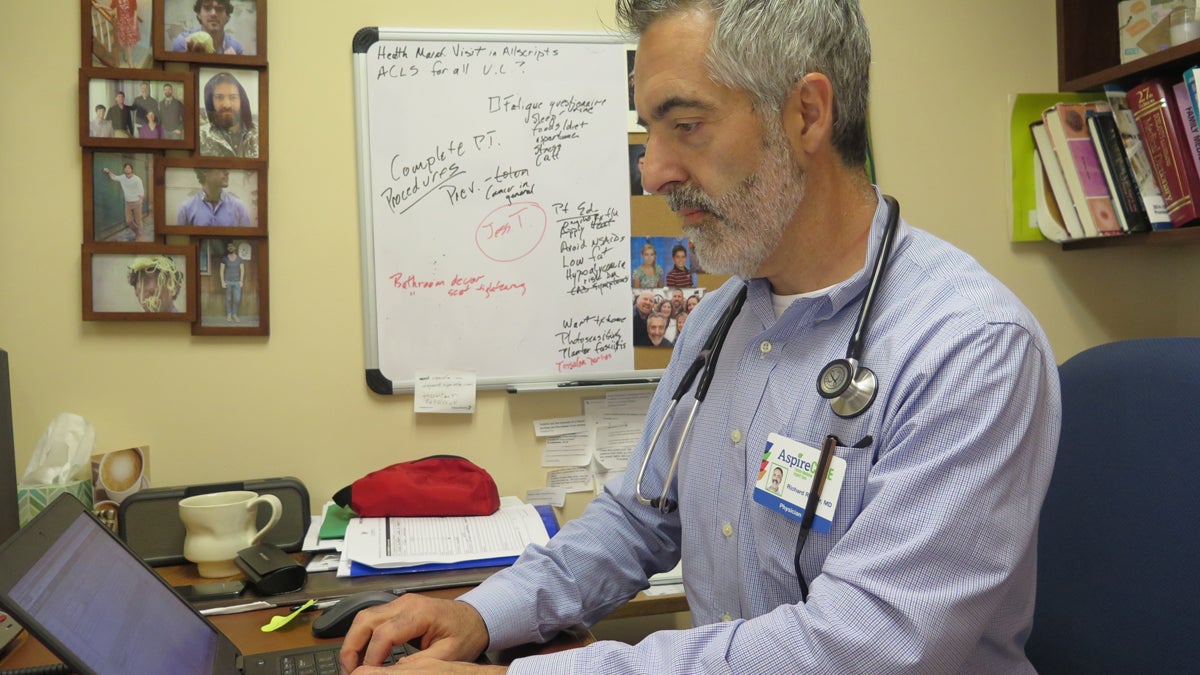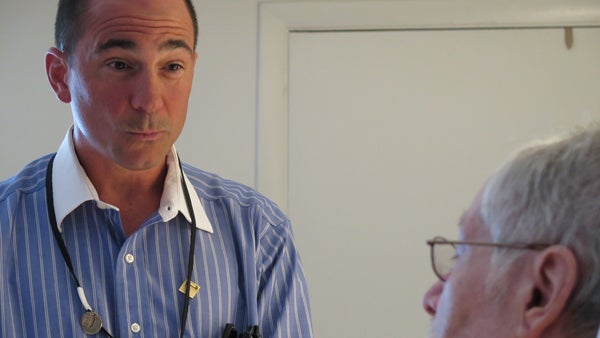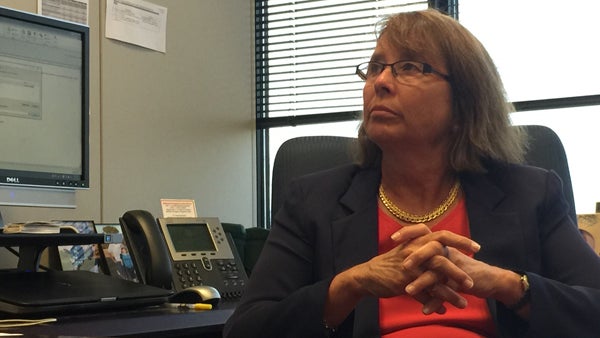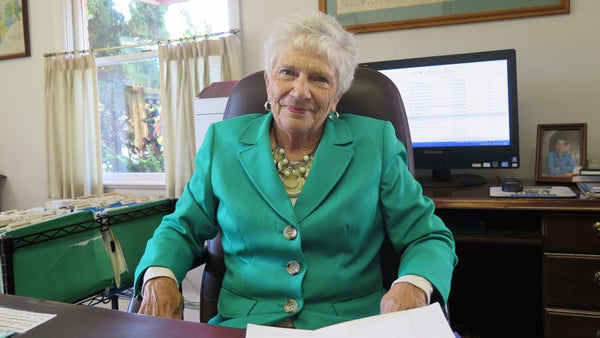Pa. nurse practitioners and doctors wage turf war

Dr. Richard Rayner works at Harrisburg’s Aspire Clinic with nurse practitioners. But, he says, the 'collaborative agreement' should remain in place.(Ben Allen/WITF)
Hundreds of thousands of people who may have only stepped inside an emergency room for health care will soon have coverage for a visit to the doctor’s office. That’s because the transition to expanded Medicaid becomes official in Pennsylvania this month.
With all these new patients, who will take care of them?
Nurse practitioners in the state are making the case they should be at least part of the answer. But a powerful doctor’s group is pushing back.
Recently, I went for a house call with Mike Lawler. Nurse practitioner Mike Lawler talks with Richard Voigt on house call in Hershey. Lawler says the “collaborative agreement” is an unnecessary expense for his practice. (Ben Allen/WITF)Lawler is a nurse practitioner and has been running his practice for nearly a decade. He asks the standard questions of Richard Voigt in Hershey, before moving on to a thorough physical exam.
Nurse practitioner Mike Lawler talks with Richard Voigt on house call in Hershey. Lawler says the “collaborative agreement” is an unnecessary expense for his practice. (Ben Allen/WITF)Lawler is a nurse practitioner and has been running his practice for nearly a decade. He asks the standard questions of Richard Voigt in Hershey, before moving on to a thorough physical exam.
But he also has to have backup available to sign some documents and answer any questions. “It costs real money that I have to pay, two doctors, not just one, but two physicians to say ‘Hey can you do this?'” he said.
Pennsylvania regulations require physicians, and only physicians, sign some paperwork, such as worker’s comp forms, or physical therapy prescriptions for Medicare patients. They also have to be on-call for nurse practitioners.
All of this can cost up to $1,000 a month. The head of the state Coalition of Nurse Practitioners, Lorraine Boch, says the arrangement simply isn’t needed.
“Nurse practitioners are not going to stop talking to our colleagues in medicine, to our colleagues in the hospital, to our colleagues in the pharmacy, just because we are not tethered to a physician by a collaborative agreement,” said Boch.
Boch’s group wants the state to drop the requirement and let NPs practice on their own. In recent months, it’s hired a PR firm, released a study claiming billions in cost savings, and donated to a powerful state senator.
“We’re telling this story right now because patients need access to health care,” Boch said. “It’s a great thing that those people are getting health insurance, but if they can’t get an appointment with a provider to utilize that health insurance, their health can’t improve.”
Independent in other states
If nurse practitioner Mike Lawler practiced in Maryland, he wouldn’t need the so-called collaborative agreement.
In fact, 20 states give nurse practitioners full authority.
“You can’t argue with almost half of the country having independent practice for nurse practitioners,” said Lawler. “And then all of a sudden saying ‘Oh wait, both of your feet are in Pennsylvania, come here for a second, you can’t actually practice independently. I know if you go over to that state, you can but over here we don’t think you can do it all the way.'”
But the Pennsylvania Medical Society is on a campaign to win hearts and minds too. Dr. Karen Rizzo, president of the Pennsylvania Medical Society, opposes an end to the “collaborative agreement” required of nurse practitioners. (Ben Allen/WITF)Earlier this year, it commissioned a poll on the topic, and its website is stocked with page upon page arguing to keep the current state law in place.
Dr. Karen Rizzo, president of the Pennsylvania Medical Society, opposes an end to the “collaborative agreement” required of nurse practitioners. (Ben Allen/WITF)Earlier this year, it commissioned a poll on the topic, and its website is stocked with page upon page arguing to keep the current state law in place.
“If you want to be a primary care doctor then go to medical school, do a family practice residency, and become a primary care or family practice physician,” said Dr. Karen Rizzo, president of the group that represents about 20,000 physicians..
Rizzo says education and training for physicians like Richard Rayner at the Aspire Clinic in Harrisburg separate him from a nurse practitioner. In a visit I sat in on, Rayner talks through a number of issues: lack of speech in a 4-year-old boy, conjunctivitis, and the coming vaccinations.
Physicians need to go through four years of medical school, plus at least three years of residency. Nurse practitioners only need a graduate degree, and their clinic training requirements are much lower.
“To say the two paths are equal is not an accurate statement because of that huge difference in education,” Rizzo said. “You can’t legislate education.”
Rizzo and the Pennsylvania Medical Society say the change would compromise patient safety. However, the evidence is thin.
Changes proposed Republican state Senator Pat Vance of Cumberland County is the chair of the Senate’s Public Health and Welfare committee. Nearly every session, going back before 2000, she’s proposed allowing nurse practitioners to work on their own. Pa. state Senator Pat Vance (R – Cumberland County) says she’s proposed a bill allowing nurse practitioners to practice independently since 1999. (Ben Allen/WITF)
Pa. state Senator Pat Vance (R – Cumberland County) says she’s proposed a bill allowing nurse practitioners to practice independently since 1999. (Ben Allen/WITF)
“I understand physicians are busy and they’re trying to do a number of patients, but nurse practitioners have the time to listen and make the patient to feel like they’re a person and that they’re really interested in their concerns. It’s just a whole different mode of how one treats people,” said Vance.
Vance, who was once a nurse, says she thinks she has the votes to get her bill out of committee, and similar legislation is in the House.
That’s where David Blumenthal picks it up. He’s the president of the Washington D.C. health policy think tank the Commonwealth Fund.
“I don’t think it’s practical to maintain the status quo,” Blumenthal said. “Physicians need to understand the turmoil that is occurring right now in their world, and they would be better off trying to find collaborative solutions that are good for patients than trying to protect their turf.”
Blumental says in an ideal world, nurse practitioners, nurses, physicians, and physician assistants would all work as a team. But in the meantime, he says, nurse practitioners should get their independence. Whether that happens may come down to the mighty Pennsylvania Medical Society.
WHYY is your source for fact-based, in-depth journalism and information. As a nonprofit organization, we rely on financial support from readers like you. Please give today.

